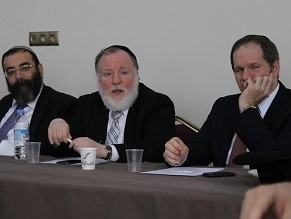|
World Jewish News

Rabbi Baksht of Odessa addresses members of the CER in Tbilisi Tuesday. (photo credit:SAM SOKOL)
|
Conference of European Rabbis look to centralize Ukraine aid
22.10.2014, Jews and Society Efforts to aid those displaced by the Moscow- backed insurgency in eastern Ukraine should be centralized, the Conference of European Rabbis declared on Tuesday at its annual assembly.
Meeting in Georgia, which went through its own war with Russia in 2008, several leading members of the religious organization were critical of efforts made thus far to ameliorate the humanitarian crisis in the former Soviet state, painting a picture of a fractured and disjointed response to the migrations accompanying the conflict.
Addressing rabbis from across the continent, CER president Pinchas Goldshmidt said that his organization “offers to the rabbis of Ukraine to establish a rabbinical committee to save the refugees and will stand behind them.”
Ukrainian Chief Rabbi Yaakov Dov Bleich, a member of the conference, was not present at the meeting and was not able to be reached for comment.
Addressing the gathering, Rabbi Shlomo Baksht, a communal leader from Odessa, complained about the American Jewish Joint Distribution Committee, one of the aid organizations active in Ukraine, stating that it had raised millions for the refugees and “done nothing.”
“We are engaged in raising funds but not in an organized manner,” Baksht continued, stating that he had rejected a JDC offer of $10,000 for the upkeep of the 100 or so refugees currently being cared for by the rabbi’s institutions.
During the back and forth, a number of rabbis expressed views highly critical of the JDC, in the end resolving to send a letter appealing to the JDC to send money directly to communities throughout Ukraine to bolster aid efforts by local communities.
“The letter should explain to the Joint [JDC] that the communities are very busy with the refugees and that they don’t have the money for it.
They could help the Joint and they should do the work… and the Joint should give them the money that was collected for this issue,” explained Rabbi Avichai Apel, a congregational rabbi from Dortmund, Germany, whose community is predominantly composed of Ukrainian emigrés.
In locations such as Dnipropetrovsk and Mariupol in eastern Ukraine, the JDC has been active in housing and feeding refugees. Rabbi Shalom Gopin of Luhansk, who fled the rebel stronghold with many members of his community, said the call for a unified committee for refugees and the critiques of the JDC were infuriating.
In a telephone interview, Gopin accused the conference of using the tribulations of Jews for politics and said that “if they want to help, they can pick up a telephone and call and ask how it is going and how they can help.”
“If they want to help, they can call me or Pinchas Vishedski,” he continued, referring to the displaced rabbi of Donetsk.
“They have had no communications with me.”
Many of the communal leaders in eastern Ukraine are affiliated with Chabad, which has its own competing chief rabbis in Kiev and is not linked to the conference.
Asked if he foresees any difficulties in convening the rabbis of Ukraine into one body, Goldshmidt replied that “the relationship of Chabad and non-Chabad rabbis in Ukraine is good on a personal level,” and that “now, in a time of crisis, they can put all the differences aside and work together.”
Several hours after the deliberations on Ukraine, Baksht stated that he had already heard back from the JDC, which had been alerted to his critique by members of the media present at the meeting, and that the American aid organization was interested in working closer together. So far no confirmation has been received from the JDC, which issued a statement defending its work with the refugees.
“JDC is proudly caring for a growing population of thousands of displaced Ukrainian Jews, including in Odessa, as part of our long-standing response to the crisis in Ukraine,” spokesman Michael Geller wrote.
“This multi-month operation, carried out in a highly challenging environment through 32 JDC-supported Hesed social welfare centers and in cooperation with local Jewish communities, has also included caring for thousands of our remaining clients in the eastern part of the country.
This is in addition to the robust relief package, including extra food, medicine, homecare, and other Jewish community services and connections, we have provided to Jews throughout the country since the worst of the unrest began earlier this year.”
By SAM SOKOL
JPost.com
|
|
